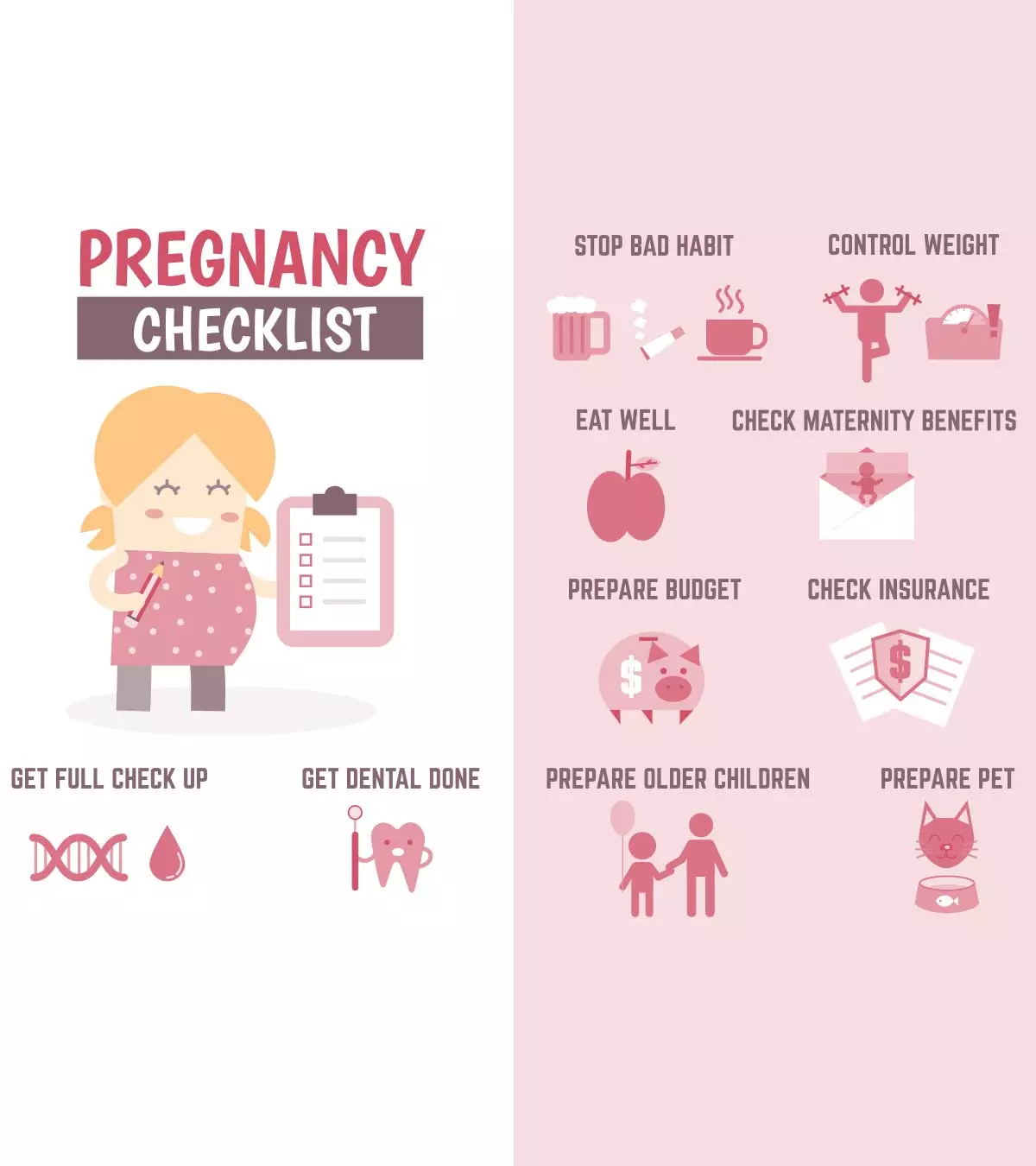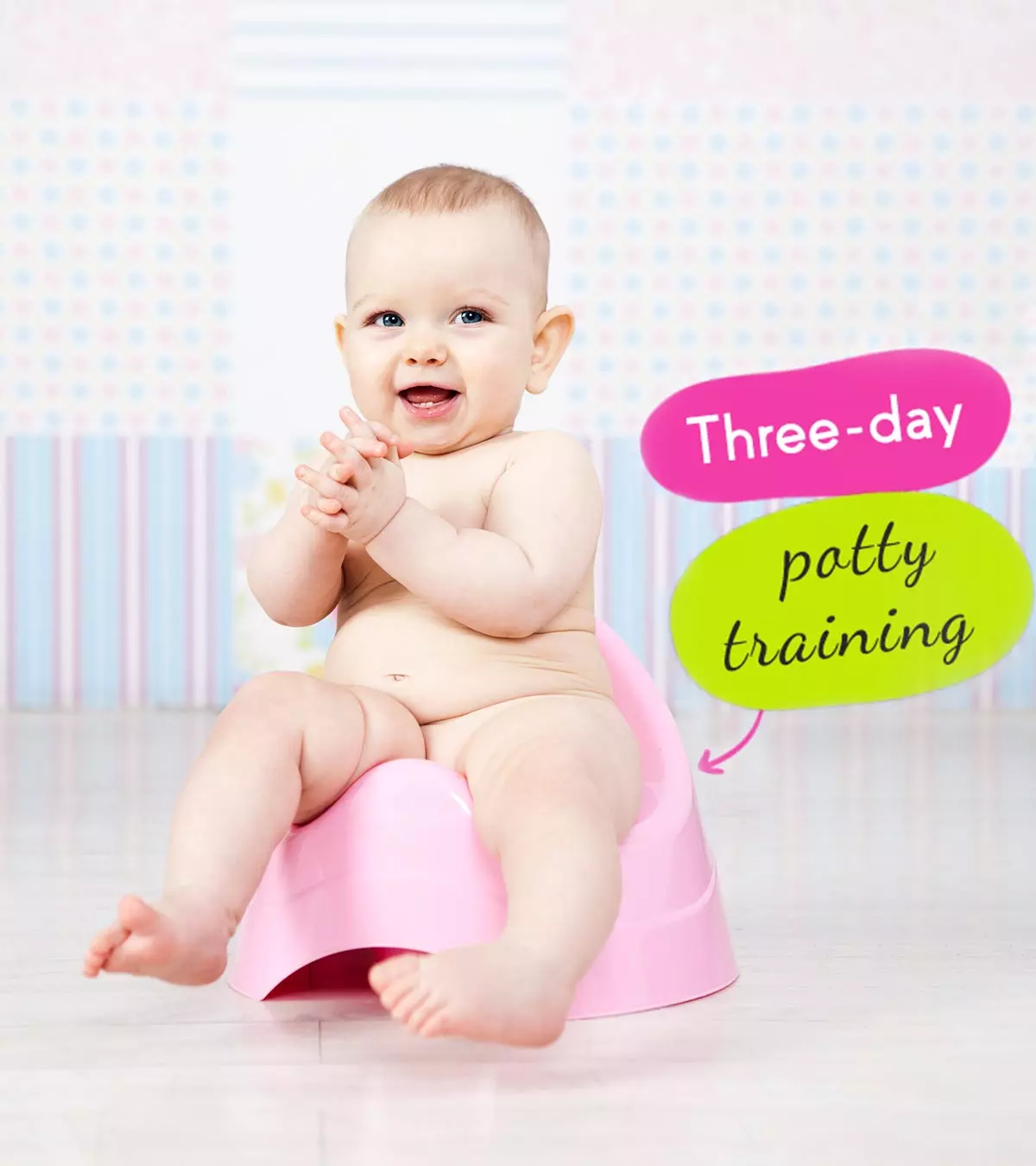

Image: Shutterstock

Breastfeeding is considered to be one of the best ways to provide nourishment to the baby. But do you know about the benefits of breastfeeding for mum? Breastmilk is full of essential nutrients required to nourish the baby and protect them from diseases and infections. In addition to that, breastmilk promotes faster postpartum weight loss in women and decreases bleeding after delivery. Keep reading this post to learn more about how breastfeeding benefits the baby and the mother.
What Are The Benefits Of Breastfeeding For A Baby?
There are over a 100 benefits, including long-term and short-term, of breastfeeding for a baby Breastmilk efficiently provides all the nutrition and energy to the babies in the first months of their life (1).
Cognitive benefits of breastfeeding:
Breastmilk has a significant impact on the cognitive growth and brain development of an infant, and we mention a few below.
- Higher IQ: Research has found that infants who consume breastmilk instead of formula tend to develop higher intelligence quotient (IQ) levels, and grow up to score better on IQ tests as they transition to school age (2). Also, there is a correlation between the span of breastfeeding and the IQ. Babies who have been breastfed through late infancy and into toddlerhood have higher IQ scores (3).
- Healthy brain size: As the baby grows so does the brain in proportion to the body. Breastfeeding ensures that the baby’s brain develops at the right pace with the correct size appropriate to that age.
- Healthier neurons: Exclusively breastfed infants display higher density of white matter tissue in the brain. White matter consists of longer neuron cells that aid in the coordination of brain parts. The white matter thus plays a vital role in determining the quality of thought process and cognitive functions. Breastfed infants can have as much as 30% more white matter than infants who are not exclusively breastfed or fed only formula (4).
- Speeds up brain development in preterm babies: Breastmilk accelerates the brain development in premature infants, which reduces the risk of encountering cognitive milestone delays. They are also less likely to face psychiatric disorders later in life (5).
- Reduced chances of ADHD: Attention deficit hyperactivity disorder or ADHD is a psychological condition that causes behavioral problems. The condition does not have a cure and has to be managed through medication or alternative therapeutic approaches for the rest of the life (6). Infants that are exclusively breastfed until six months and beyond display a lesser probability of developing ADHD (7). It is not known how breastmilk provides protection against ADHD, but it could be due to the milk’s general cognitive benefits.
Immunological benefits:
Breastfeeding provides numerous immunological advantages by boosting a baby’s immunity against various pathogens.
- Provides protection against general illness: Breastmilk is packed with several antibodies including those for general diseases such as the common cold. For instance, if a mother suffers from common cold, she automatically transfers her immunity through breastmilk. Breastfeeding protects against bacterial infections such as bacterial meningitis and pneumonia (8).
- Protects against some severe viral diseases: Breastmilk protects against viruses such as respiratory syncytial virus (RSV) and varicella-zoster, the latter causes chickenpox and shingles. Experts note that if a mother ever suffered chickenpox, she automatically passes viral immunity to her baby. It is a passive immunity, which may not guarantee complete protection, but still significantly brings down the chances of the baby contracting the illness (9).
- Stimulates the growth of healthy intestinal bacteria: Small intestines contain probiotic bacteria that are present in infants at birth. However, the bacterial population is low in babies. Special sugars and fats in breastmilk stimulate the multiplication of these ‘good’ bacteria. A healthy intestinal bacteria population protects against invasive bacteria such as E.coli (10).
- Fewer allergies and autoimmune diseases: A breastfed infant is less likely to have an allergic reaction than formula-fed babies. Immunoglobulins in the breastmilk train the baby’s immune system to become adept at differentiating a pathogen from a harmless protein. As a result, the infant becomes less prone to allergy-related conditions such as asthma (11). There is also a lowered risk of other autoimmune diseases such as Crohn’s disease.
- Reduces risk of SIDS, leukemia, and diabetes: Breastfed babies are less likely to experience sudden infant death syndrome (SIDS), cancers such as leukemia, and type 1 and type 2 diabetes (12).
Physical benefits:
It is not just the brain and immune system, but also the body that benefits from the goodness of breastmilk.
- Lower incidence of obesity: Breastfed infants have been noted to have fewer instances of obesity in toddlerhood and even later in life (13). It also means it is easier for the infant to maintain a healthy weight not just for now, but also in the future.
- Helps in timely growth and development: A baby needs to attain certain developmental milestones to be considered growing normally. Breastfed infants have a better run at physical growth and tick all the milestones on time when compared to exclusively formula-fed babies (14).
- Better teeth development and less dental problems: There is better development of primary/deciduous teeth with fewer complications. Feeding directly from the breast reduces the chances of bottle tooth decay. Milk sugars also are not likely to harm the baby’s teeth, unlike the sugars found in formula (15).
Those are the major advantages a baby can derive from breastmilk. Now, let’s see what a lactating mother gets by feeding her baby.
What Are The Benefits Of Breastfeeding For The Mother?
Here are some scientifically proven benefits of breastfeeding a baby.
Health benefits:
While your baby benefits from the breastmilk, you gain health advantages as well.
- Faster postpartum recovery: Mothers who breastfeed recover faster post-delivery even if it is a Cesarean-section. Breastfeeding helps the uterus involute faster, as suckling at the breast stimulates the release of the hormone oxytocin, which helps the uterus to return to its original size sooner (16).
- Breastfeeding can help you return to pre-pregnancy weight faster: Producing milk uses additional calories that body sources from the body fat accumulated during pregnancy. It means, mothers, who exclusively breastfeed, tend to return to their pre-pregnancy shape and weight faster (17).
- Lower risk of breast and ovarian cancers: The chances of getting breast and ovarian cancers are lower in women who breastfeed. Researchers found that a woman can reduce her risk of breast cancer by 50% if she breastfed for two years in life (18). Other studies noted a reduced chance of having ovarian cancer if the mother breastfed at least for a year (19). These benefits last a lifetime thus making breastfeeding a form of natural health insurance for a woman.
- Lowers the risk of high blood pressure, cardiovascular disease, and diabetes: Extensive research has proven that when you breastfeed, you invariably reduce the chance of developing hypertension (high blood pressure), cardiovascular diseases such as heart attack, and type 2 diabetes (8).
- Mitigated chances of bone diseases: There is a reduction in the chances of getting osteoporosis and rheumatoid arthritis (20). Women who breastfeed for at least 13 months, reduce the risk of rheumatoid arthritis by half for the rest of their life (21).
Emotional and psychological benefits:
Most mothers experience a sense of joy every time they breastfeed their baby. It is the emotional and psychological gain a mother receives on feeding her baby.
- Happiness and satisfaction: Suckling of the breast by an infant releases oxytocin, which helps a mother relax and have a happy feeling. Oxytocin also promotes a sense of attachment and love between the mother and the baby. Another hormone is prolactin, which stimulates the production of milk in the breasts and its flow from the nipple. The hormone prolactin, which stimulates the production of milk and helps to release it through the nipple ducts, may help the mother to relax and enjoy the baby more while nursing (22).
- Establishes a strong bond with the baby: The skin-to-skin contact between the mother and the baby helps the infant feel secure and the mother experiences a sense of maternal pride (23). Experts believe that the development of this bond early in life may help the mother have stronger ties with her child when he steps into adolescence.
- Better stress resistance: Breastfeeding mothers may have a higher resistance to stress. A study has found low levels of stress hormones in their blood. Interestingly, the stress was not limited to mind, but also the body as low levels of stress indicators were found in the muscles as well (24).
- Lower risk of postpartum depression: Mothers who breastfeed after delivery have a lower tendency to develop postpartum depression. It could be due to the repeated release of feel-good hormones such as oxytocin. Breastfeeding mothers also report better quality of psychological health than mothers that primarily feed formula (25).
- May help you be a relaxed parent: The American Academy of Pediatrics (AAP) states that partners can play an essential role in providing the mother a comfortable environment for feeding (26). A lactating woman is more likely to continue breastfeeding for longer when she has the active encouragement of her partner. Longer breastfeeding tenure equates greater health benefits for the baby (27).
Financial, economic, and environmental benefits:
Feeding from the breast lets you end the month with lesser expenditure. There are also some general economic and environmental benefits.
- Breastfeeding is generally wallet-friendly: Formula is expensive. Moreover, as the baby grows, his dietary requirements change making it imperative to purchase more complex and expensive formula. Breastfeeding is free and is available anytime. When you feed directly from the breast, you can also save on buying milk-expressing equipment and bottles. There is also no extra baggage to carry when you travel.
- Good for the economy: A study found that globally about $3.6 billion could be saved by mothers if they all opted for exclusive breastfeeding for the first six months of their baby’s life (29). Experts suggest that protection through breastfeeding can help globally save about $14 billion in pediatric healthcare costs.
- Less environmental waste: Breastfeeding does not create leftover cans and measuring cups, which is a collateral waste generated by formula feeding. Less waste generation leads to less garbage.
No doubt, breastmilk has immense benefits for the mother and baby. But most mothers wonder about the ideal tenure of breastfeeding to reap optimum benefits.
How Long To Breastfeed To Get Benefits?
There is no fixed duration to breastfeed. When considering the duration you wish to feed your baby, do take note of the following points:
- Exclusive till six months: Pediatric and medical experts throughout the globe including the World Health Organisation recommend exclusive breastfeeding up to six months and then breastfeeding in combination with solid food up to 12 months and beyond (29).
- Continue after 12 months: The AAP recommends breastfeeding beyond the first birthday and encourages mothers to do so (30). A toddler may get most of his nutrition from solid food, but he still enjoys added benefits of breastmilk that contains unique substances such as antibodies.
- Can extend to two years and beyond: The World Health Organisation (WHO) recommends breastfeeding up to two years and even beyond, if the mother and toddler wish to do so (1). WHO states that breastmilk is a “natural food”. Even when the baby is a year-and-a-half old, breastmilk is capable of providing a third of the toddler’s nutritional requirements.
As evident from the recommendations of these credible organizations, there is no stipulated tenure to breastfeed a baby. Mothers continue breastfeeding beyond second year, even until the toddler is three years old. It marks the end of toddlerhood, and the child is now old enough to get all his nutritional requirements from solid food alone. While breastfeeding is best for an infant and toddler, several mothers wonder if there are any disadvantages of breastfeeding.
Are There Any Disadvantages Of Breastfeeding?
No. There are no disadvantages of breastfeeding, either for the baby or the mother. However, it could have some irritants and social challenges. Do note no scientific evidence proves them to be strong detrimental factors to avoid or stop breastfeeding. But it is good to know the flipside.
- Pain, soreness, and dry nipples: Mothers may experience pain and soreness for the first two weeks of breastfeeding. Additionally, nipples may go dry and crack causing immense discomfort. Pain during breastfeeding could be due to several reasons such as poor latching and infection. Latching problems can be rectified by consulting a lactation specialist.
- Mother’s diet and medications may be more restricted: You have to be extra watchful of what you eat when you breastfeed. For instance, you will have to cut down on substances such as alcohol and caffeine. Dietary changes can be managed, but vital medicines may sometimes be a problem. Discuss with your doctor the safety of the medicines you have to take. Most medications have safe alternatives to take when breastfeeding.
- Breasts may become saggy: Some women notice a significant change in the breast shape when breastfeeding. While constant suckling can loosen the breast tissue, the change is not irreversible. According to the AAP, mothers will find their breast returning to their original shape after they stop breastfeeding, and it is the least likely reason for a woman’s breasts to sag (31).
- May interfere with work: One of the biggest challenges is choosing between breastfeeding and working. The scenario depends on the employer and the local legislation that mandate breastfeeding facilities at work. UNICEF and WHO state that providing breastfeeding resources encourages lactating mothers to continue working, which improves efficiency and increases productivity thus actually benefiting the employer (32). If you are a lactating mother, speak to your employer about the possible options and alternatives for you to continue breastfeeding.
- Baby may bite when teething: A baby may sometimes nip the breast when he has sprouted teeth or is teething. However, biting while breastfeeding can be prevented. The AAP recommends dissuading an infant by saying “No” and unlatching when he bites (33). The baby understands that biting is equal to having no breastmilk and eventually subdues the impulse to bite.
- Initially, moms may feel awkward to feed in public: Breastfeeding can be done anywhere, but you need to be comfortable with feeding the baby in public. While some women wouldn’t mind, a few others may want to find a private place to feed their baby. Those who feel awkward to feed in public may express breastmilk and carry it in a bottle. Alternatively, you may use a nursing stole or dress that lets you breastfeed in public.
These challenges can be overcome with appropriate intervention. But there might be situations where a mother is discouraged to breastfeed her infant. It is not because breastmilk is bad for the infant but because some conditions make breast milk unsuitable for the baby.
Situations In Which It Is Not Safe To Breastfeed
Breastfeeding may not be an option in the following conditions and situations:
- Galactosemia is a rare hereditary disorder where the baby’s digestive system is unable to digest the sugar called galactose found in the milk of all mammals including human beings (34). Such babies cannot be breastfed even if otherwise healthy. Non-milk based formula such as soy formula is the only alternative for such infants.
- It has long been known that a mother with HIV can pass the virus through breastmilk to her healthy infant. In fact, about 30% babies born to HIV-positive mothers are quite likely to catch the virus either during delivery or through breastfeeding (35). Medications available for pregnant HIV-positive mothers can help reduce the chances to less than 1%. Forfeiting breastfeeding is the single most successful measure to mitigate the chances of the baby contracting HIV from the HIV-positive mother.
- Women undergoing chemotherapy (for cancer treatment) are advised against breastfeeding their baby since the drugs can pass to the infant through breastmilk. Women who had breast or other cancers in the past, but are cured can breastfeed without any interruptions.
- Those suffering from tuberculosis and hepatitis B and C, need to pause breastfeeding. For hepatitis B, an infant should receive a vaccination, which is safe to administer even to the newborns (36). Post this, the baby can be breastfed. Mothers who catch tuberculosis should complete at least two weeks of treatment and get a doctor’s approval before resuming breastfeeding.
In the cases when the baby cannot feed on breastmilk at all, a formula is the only option. Your baby’s pediatrician can recommend a relevant formula best suited to your baby’s nutritional requirements.
There are several benefits of breastfeeding for moms that are sometimes unknown to them. Besides the popular benefits such as a higher IQ, faster brain development, increased immunity, protection from viral diseases, and reduced risk of systemic diseases such as diabetes, leukemia, etc., breastfeeding also has numerous health benefits for mothers. If you or the baby are suffering from any health conditions that may contradict breastfeeding, you may consult a lactation consultant or pediatrician who may suggest the best possible alternatives.
References
- Breastfeeding.
https://www.who.int/health-topics/breastfeeding#tab=tab_1 - Elizabeth B. Isaacs et al.; (2011); Impact of breast milk on IQ brain size and white matter development.
https://www.ncbi.nlm.nih.gov/pmc/articles/PMC2939272/ - Wieslaw Jedrychowski et al.; (2011); Effect Of Exclusive Breastfeeding On The Development Of Children’s Cognitive Function In The Krakow Prospective Birth Cohort Study.
https://www.ncbi.nlm.nih.gov/pmc/articles/PMC3747316/ - Breastfeeding benefits babies’ brains.
https://news.brown.edu/articles/2013/06/breastfeeding - Breast milk linked to significant early brain growth in preemies.
https://medicine.washu.edu/news/breast-milk-linked-to-significant-early-brain-growth-preemies/ - Treatment of ADHD.
https://chadd.org/about-adhd/treatment-of-adhd/ - Diane D Stadler et al.; (2016); Recalled Initiation and Duration of Maternal Breastfeeding Among Children with and Without ADHD in a Well Characterized Case-Control Sample.
https://pubmed.ncbi.nlm.nih.gov/25749651/ - The Benefits of Breastfeeding for Baby & for Mom.
https://my.clevelandclinic.org/health/articles/15274-benefits-of-breastfeeding - How long do babies carry their mother’s immunity?.
https://www.nhs.uk/pregnancy/labour-and-birth/after-the-birth/getting-to-know-your-newborn/ - Federica Guaraldi and Guglielmo Salvatori; (2012); Effect of Breast and Formula Feeding on Gut Microbiota Shaping in Newborns.
https://www.ncbi.nlm.nih.gov/pmc/articles/PMC3472256/ - Breastfeeding Benefits Both Babies and Moms.
https://www.urmc.rochester.edu/news/publications/health-matters/healthy-start-breastfeeding-benefits-for-babie-1 - Breastfeeding Benefits Your Baby’s Immune System.
https://www.healthychildren.org/English/ages-stages/baby/breastfeeding/Pages/Breastfeeding-Benefits-Your-Babys-Immune-System.aspx - Overweight And Obesity.
https://www.unicef.org.uk/babyfriendly/news-and-research/baby-friendly-research/infant-health-research/infant-health-research-allergies/ - Anosh A Khan et al.; (2019); Predicting the Relationship Between Breastfeeding and Gross Motor Milestones Development: The Practice and Prevalence of Breastfeeding in Metropolitan Areas of Sindh Pakistan.
https://www.ncbi.nlm.nih.gov/pmc/articles/PMC6456361/ - Breastfeeding: 6 Things Nursing Moms Should Know About Dental Health.
https://www.mouthhealthy.org/all-topics-a-z/breastfeeding/ - Recovering from Delivery (Postpartum Recovery).
https://familydoctor.org/recovering-from-delivery/ - Breastfeeding vs. Formula Feeding.
https://kidshealth.org/en/parents/breast-bottle-feeding.html - Breast cancer risk reduced 50 percent by breastfeeding two or more years.
https://news.yale.edu/2001/01/25/breast-cancer-risk-reduced-50-percent-breastfeeding-two-or-more-years - Breastfeeding lowers your breast cancer risk.
https://www.mdanderson.org/publications/focused-on-health/breastfeeding-breast-cancer-prevention.h19-1589046.html#:~:text=It%20also%20found%20the%2012 - Breastfeeding.
https://www.urmc.rochester.edu/MediaLibraries/URMCMedia/finger-lakes-regional-perinatal/AWOHNNBreastfeedingStatement.pdf - 10 More Reasons to Breastfeed!
https://www.purdue.edu/hr/Benefits/WorkLife/ - Benefits of Breastfeeding for Mom.
https://www.healthychildren.org/English/ages-stages/baby/breastfeeding/Pages/Benefits-of-Breastfeeding-for-Mom.aspx - Psychological Benefits of Breastfeeding.
https://www.healthychildren.org/English/ages-stages/baby/breastfeeding/Pages/Psychological-Benefits-of-Breastfeeding.aspx - Kathleen M. Krol and Tobias Grossmann; (2018); Psychological effects of breastfeeding on children and mothers.
https://www.ncbi.nlm.nih.gov/pmc/articles/PMC6096620/#:~:text=In%20mothers%2C%20breastfeeding%20significantly%20reduces - Veronica Rivi et al.; (2025); Mind the Mother When Considering Breastfeeding.
https://www.frontiersin.org/journals/global-womens-health/articles/10.3389/fgwh.2025.00003/full - Dad’s Role in Breastfeeding.
https://www.healthychildren.org/English/ages-stages/baby/breastfeeding/Pages/Dads-Role-in-Breastfeeding.aspx - Facts For Fathers About Breastfeeding.
https://www.healthychildren.org/English/ages-stages/baby/breastfeeding/Pages/Facts-for-Fathers-About-Breastfeeding.aspx - Jon Weimer; (2001); The Economic Benefits of Breastfeeding: A Review and Analysis.
https://ageconsearch.umn.edu/nanna/record/33813/files/fa010013.pdf?withWatermark=0&withMetadata=0®isterDownload=1&version=1 - Infant and young child feeding.
https://www.who.int/en/news-room/fact-sheets/detail/infant-and-young-child-feeding - Continuing Breastfeeding Beyond The First Year.
https://www.healthychildren.org/English/ages-stages/baby/breastfeeding/Pages/Continuing-Breastfeeding-Beyond-the-First-Year.aspx - Common Myths About Breastfeeding.
https://www.healthychildren.org/English/ages-stages/baby/breastfeeding/Pages/Common-Myths-About-Breastfeeding.aspx - Breastfeeding support in the workplace.
https://www.unicef.org/media/73206/file/Breastfeeding-room-guide.pdf - Breastfeeding After Your Baby Gets Teeth.
https://www.healthychildren.org/English/ages-stages/baby/breastfeeding/Pages/When-Your-Baby-Gets-Teeth.aspx - Galactosemia.
https://rarediseases.org/rare-diseases/galactosemia/ - Where We Stand: Preventing Prenatal Transmission of HIV.
https://www.healthychildren.org/English/health-issues/conditions/sexually-transmitted/Pages/Where-We-Stand-Preventing-Prenatal-Transmission-of-HIV-.aspx - Serious Illnesses and Breastfeeding.
https://www.healthychildren.org/English/ages-stages/baby/breastfeeding/pages/Serious-Illnesses-and-Breastfeeding.aspx
Community Experiences
Join the conversation and become a part of our nurturing community! Share your stories, experiences, and insights to connect with fellow parents.
Read full bio of Regina Kincaid
Read full bio of Swati Patwal
















